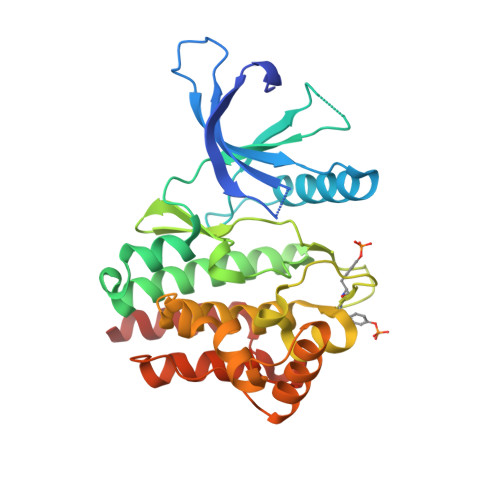Discovery of VX-509 (Decernotinib): A Potent and Selective Janus Kinase 3 Inhibitor for the Treatment of Autoimmune Diseases.
Farmer, L.J., Ledeboer, M.W., Hoock, T., Arnost, M.J., Bethiel, R.S., Bennani, Y.L., Black, J.J., Brummel, C.L., Chakilam, A., Dorsch, W.A., Fan, B., Cochran, J.E., Halas, S., Harrington, E.M., Hogan, J.K., Howe, D., Huang, H., Jacobs, D.H., Laitinen, L.M., Liao, S., Mahajan, S., Marone, V., Martinez-Botella, G., McCarthy, P., Messersmith, D., Namchuk, M., Oh, L., Penney, M.S., Pierce, A.C., Raybuck, S.A., Rugg, A., Salituro, F.G., Saxena, K., Shannon, D., Shlyakter, D., Swenson, L., Tian, S.K., Town, C., Wang, J., Wang, T., Wannamaker, M.W., Winquist, R.J., Zuccola, H.J.(2015) J Med Chem 58: 7195-7216
- PubMed: 26230873
- DOI: https://doi.org/10.1021/acs.jmedchem.5b00301
- Primary Citation of Related Structures:
4YTC, 4YTF, 4YTH, 4YTI - PubMed Abstract:
While several therapeutic options exist, the need for more effective, safe, and convenient treatment for a variety of autoimmune diseases persists. Targeting the Janus tyrosine kinases (JAKs), which play essential roles in cell signaling responses and can contribute to aberrant immune function associated with disease, has emerged as a novel and attractive approach for the development of new autoimmune disease therapies. We screened our compound library against JAK3, a key signaling kinase in immune cells, and identified multiple scaffolds showing good inhibitory activity for this kinase. A particular scaffold of interest, the 1H-pyrrolo[2,3-b]pyridine series (7-azaindoles), was selected for further optimization in part on the basis of binding affinity (Ki) as well as on the basis of cellular potency. Optimization of this chemical series led to the identification of VX-509 (decernotinib), a novel, potent, and selective JAK3 inhibitor, which demonstrates good efficacy in vivo in the rat host versus graft model (HvG). On the basis of these findings, it appears that VX-509 offers potential for the treatment of a variety of autoimmune diseases.
- Vertex Pharmaceuticals (Canada) Inc. , 275 Armand-Frappier, Laval, Québec H7V 4A7, Canada.
Organizational Affiliation:


















